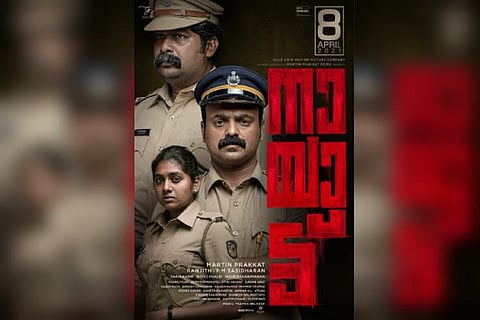

On their way to a house in Piravom, a senior policeman explains to his subordinate that they are going on a “quotation” work – a euphemism for beating up people on assignment. “Even goons have the freedom to say yes or no to a quotation work, but we don’t,” says he, smiling pitifully. A young man had visited the house the night before to give a gift to a young woman living there. The woman happened to be related to a minister. The minister wanted action against the man. So, the policemen have to go to the house and create evidence that the man tried to burn it, and accuse him in a case.
It is a short sequence in Nayattu (Hunt), quietly setting the premise of the film — the police are not independent, they are under the control of the ruling government. Director Martin Prakkat appears to believe in brevity and you can spot this throughout the film, there is not an unwanted scene in all of the two hour runtime of Nayattu.
Joju George, Kunchacko Boban and Nimisha Sajayan play three police officials at a station in Piravom, each coming from difficult circumstances. From brief glimpses of their respective homes, you learn about Manikandan aka Maniyan (Joju), Praveen Thomas (Kunchacko) and Sunitha (Nimisha). Mahesh Narayanan’s editing ensures that a lot is packed into those few moments.
Watch: Trailer of Nayattu
By now, it is no surprise that emotions can flip through Joju’s face faster than the pages of a book. Introduced as a jovial character asking friendly questions to the newly joined Praveen, his countenance is entirely different on another occasion when he asks Praveen to drive him home. He had just seen at the police station, a young girl caught with a young man for getting intimate in a car. Maniyan had raised his voice against the man but spoken gently with the girl. He immediately becomes tense, and makes anxious calls home. It is only at his home that you learn why. There is a teenage daughter that Maniyan dotes on and worries over constantly.
Praveen’s background is briefer. He is athletic, for some reason has black circles under his eyes, and appears not interested in getting married. His only worry is about his aged mother who is not well. Kunchacko Boban, a seasoned actor by now, settles comfortably into the role of the new policeman, playing to the tunes policemen are expected to.
Sunitha is the most impoverished of the lot, living in a small house in a remote area with her mother, and troubled by a gang of young men aligned to a political party. It is hard to believe that Nimisha is only a few films old, considering the maturity with which she handles each diverse character.
Martin’s love for brevity brings this comfortable picture of life and work to a close with a lovely song (Vishnu Vijay) when hints of a new romance are dropped. Something goes wrong as it should in thrillers right at this juncture, and our key characters are on the run. Terse background music (Akhil Alex), luring visuals (Shyju Khalid) and entry of newer characters ensure that you are focused on the cat and mouse game. But the earlier tightening suffers a jolt as the film turns into an extended chase, circling around the runners and the chasers and the political play behind it all. Jaffer Idukki is really smooth as the no-nonsense Chief Minister, entirely different from all the villainy-witty characters he has done before.
While a part of the film appears to have references to a real life murder story in Kerala from a few years ago, certain lines appear problematic. In one instance, an arrested goon who has been a nasty troublemaker, tells Praveen, “Gone are the times when we had to bend down.” It appears to be a reference to the times when Dalits were treated as untouchables and had to lower their heads before the dominant caste. In another instance, there is talk about a Dalit organisation raising the issue of a Dalit man’s murder, when unknown to them, it was, in fact, an accident. Such portrayals are problematic when caste atrocities continue to be committed against Dalits, and the ongoing fight has been a long one.
The film, with its abrupt ending, does not seem to need closure. Curtains fall when several questions remain unanswered, the film daringly stating that this is all there is to say, and the helplessness of those trapped in this system will continue to exist.
Disclaimer: This review was not paid for or commissioned by anyone associated with the film. Neither TNM nor any of its reviewers have any sort of business relationship with the film's producers or any other members of its cast and crew.